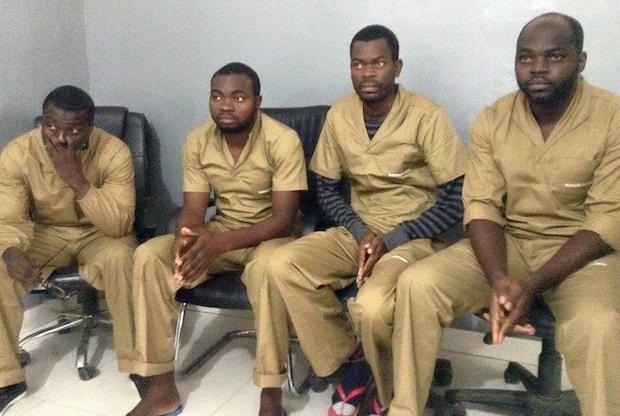
Four of the jailed Angolan activists in the case that has dragged on since June. Photograph: Ekuva Estrela
Over the past month, the Angolan government has continued its crackdown on freedom of expression and the right to assemble in the country.
Most recently, on 14 September, human rights activist José Marcos Mavungo received a six year jail sentence for attempting to hold a peaceful protest on 14 March. Even though the demonstration was banned, a judge of the provincial court of Cabinda charging him with rebellion.
Mavungo is a former member of “Mpalabanda”, a group that was banned after it highlighted rights abuses by security forces in the province.
Concerns have been raised that the activist’s sentencing represents a serious abuse of the Angolan justice system. “It did not meet basic due process guarantees and formal trial standards required by Angolan law,” wrote 2015 Index journalism award winner Rafael Marques de Morais, Angolan activist and founder of anti-corruption website, Maka Angola. “The judge, Jeremias Sofrera, ignored the blatant lack of evidence exposed during the trial and all allegations and complaints presented by the defense lawyers.”
Mavungo’s legal counsel said they will appeal his sentencing.
Marques has repeatedly been targeted by Angolan authorities for his investigative journalism. He was briefly detained and had his passport confiscated by immigration officers on 10 September while returning from a trip to South Africa. Marques wrote that he was given contradicting explanations as to why he was being held. It was unclear whether a new order had been issued or an old one banning him from leaving Angola was still in force. Ultimately his passport was returned and he was released.
The incident did not deter the Marques, who only a few days later helped to organise a meeting in solidarity with political prisoners, which was attended by more than a thousand people. The event was broadcast live by the radio station and streamed through various social networks for nearly four hours.
The mother of 19-year old political prisoner Nito Alves, Adalia Chivonde, told the gathering that her son was being subjected to psychological torture and isolation. “We are asking the President and General Ze Maria [Chief of the Military Intelligence and Security] to free our sons,” she said.
One of the most well-known recent cases is that of 15 men imprisoned since June on charges of civil disobedience and planning to overthrow the government. The men, who were part of a study group, had been organising peaceful demonstrations against President José Eduardo dos Santos since March 2011. On 28 August, the families of the prisoners staged a march in support their loved ones despite a banning order issued by the local governor.
The families have repeatedly attempted to hold public demonstrations to bring attention to their relatives’ situation, but have been thwarted by bureaucratic obstacles. The family members have responded by submitting petitions and modifying their plans to meet the official objections.
The protest was supposed to take place at 3pm on Friday 28 August at Praca da Independencia (Independence Square) in Luanda. However, as the protest coincided with the 73rd birthday celebrations of President dos Santos, the streets were not only filled with music, dancing and craft fairs, but also secret police agents and the presidential guard, with RPG-7s and AK47s in tow.
“We are not going to sit and wait for our sons. We really are going to march. It is our right,” stated Adália Chivonde, the mother of prisoner Manuel Nito Alves, in the days running up to the demonstration.
“We will not be able to hold the demonstration because, as you can see, [they] have already invaded all the space,” said Elsa Caolo, sister of Osvaldo Caolo, one of the jailed men. “We can not even walk in peace — we are to be chased down the street […] we can’t speak out.”




